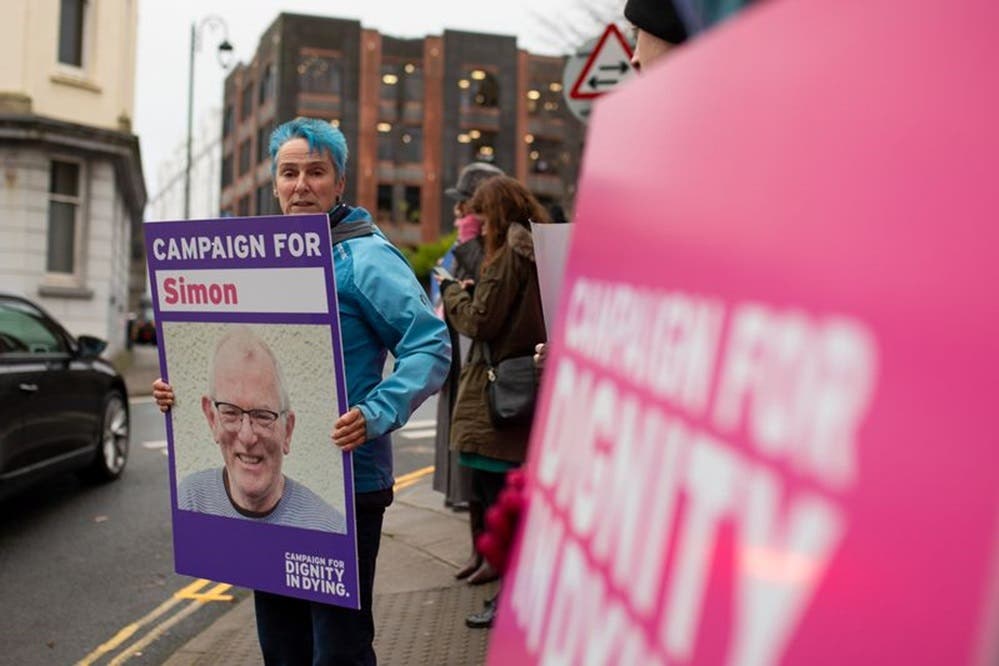Assisted Dying: Isle of Man parliament hears widow’s speech against referendum
The island’s chief minister has said the Bill ‘changes the social contract’ on the island and requires a public mandate.

Your support helps us to tell the story
From reproductive rights to climate change to Big Tech, The Independent is on the ground when the story is developing. Whether it's investigating the financials of Elon Musk's pro-Trump PAC or producing our latest documentary, 'The A Word', which shines a light on the American women fighting for reproductive rights, we know how important it is to parse out the facts from the messaging.
At such a critical moment in US history, we need reporters on the ground. Your donation allows us to keep sending journalists to speak to both sides of the story.
The Independent is trusted by Americans across the entire political spectrum. And unlike many other quality news outlets, we choose not to lock Americans out of our reporting and analysis with paywalls. We believe quality journalism should be available to everyone, paid for by those who can afford it.
Your support makes all the difference.A widow whose late husband suffered a “horrible” death after a motor neurone disease diagnosis has argued against having a referendum on an assisted dying law on the Isle of Man.
Sue Biggerstaff became tearful as she made her impassioned plea to the island’s parliament during its continued debate on the Assisted Dying Bill.
Recounting the difficult final period of her husband Simon’s life, she told how within just two months of his MND diagnosis, he was paralysed from the neck down.
That's one of the dangers of a referendum. You're asking lots of people with no experience or understanding, they are distant from it, as I was before Simon.
Recalling his suffering, Mrs Biggerstaff told Members of the House of Keys (MHKs): “There was a total loss of dignity. He couldn’t speak properly, couldn’t do anything.
“There were so many horrible, horrible things happening to him. Nobody should have to live through it. It’s just awful. Awful.”
She warned of misinformation around the Bill, with members of the public appearing uncertain as to who it would apply to, and said a referendum could see people with no real experience of prolonged and difficult deaths casting an ill-informed vote.
She said: “Anybody who hasn’t (had experience of a difficult death) hasn’t got a clue what these people are going through. They really haven’t. And that’s one of the dangers of a referendum. You’re asking lots of people with no experience or understanding, they are distant from it, as I was before Simon.
“People talk about palliative care. ‘Oh you can get good palliative care’. Yes, you can. He had it.”
She detailed how despite such care, her husband had still suffered.
Mrs Biggerstaff added: “No-one should suffer like that. And no-one has the right to tell another how much suffering they could and should bear.”
You don't need a referendum. For people who are at the end of their life and experiencing a truly miserable death, we need assisted dying
The island’s chief minister Alfred Cannan has put forward an amendment that the overall Bill should be put to a referendum before a new law comes into effect.
Mr Cannan told the parliament last week that the Bill “changes the social contract” on the island and requires a public mandate.
But, ending her speech, Mrs Biggerstaff urged MHKs not to “spend time and effort trying to delay the passage of this Bill”.
She said: “You don’t need a referendum. For people who are at the end of their life and experiencing a truly miserable death, we need assisted dying. Thank you for listening.”
Dr Alex Allinson, the MHK and doctor who proposed the Bill, said he believes a referendum, with a yes or no answer “would be inappropriate given the complexity of the issue”.
He repeated his insistence that the amendment is an attempt to delay the progress of the Bill, saying: “If honourable members were serious about a referendum, why wasn’t this brought two years ago when I asked for leave to introduce (the Bill)?”
He added: “Why didn’t government decide to embark on a national information campaign over the complexity of the issue and enter into an open debate with our community as seen in other jurisdictions?
“The answer for these questions is that the issue of assisted dying, both in this honourable court and in the court of Westminster, has always been viewed as a parliamentary issue, an issue which should be taken up by one of us to bring through on behalf of the constituents who place their trust in us and placed us here to represent them.”
As it stands, the Bill is only for adults who have been resident on the island for five years, have a terminal illness with a life expectancy of no more than 12 months, and who have a settled intention to end their life.
Campaigners have said the Isle of Man could become the first part of the British Isles to legalise assisted dying.
Once this current clauses stage has been concluded, the Bill requires a third reading in the House of Keys, before moving to the parliament’s Upper House.
Campaigners have previously said that if it gains royal assent next year, assisted dying could be available to eligible Manx residents from 2027.